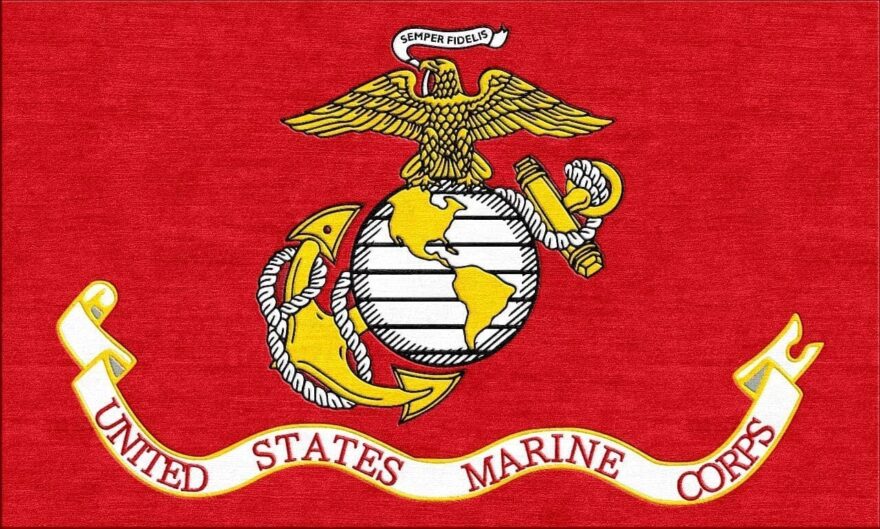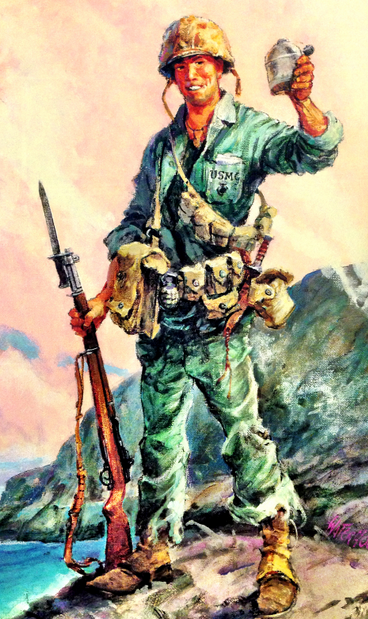by Rod Carlson
It was nearly noon and I was sitting in the cockpit looking up at rotor blades turn slower and slower and finally lurch to a stop. Our helicopter had just touched down at an obscure landing pad on the outskirts of Danang.
Bruce Lake reached over his head to the instrument panel and flipped the lever that turned off the screaming turbine used to power the aircraft’s systems during shutdowns. Helicopter aircraft commanders typically order their copilots to handle such details, but Bruce Lake and I were pals, both first lieutenants and he simply wasn’t that kind of guy. Bruce Lake hefted himself out of his armor-plated wingchair and squeezed through the narrow passage to the cargo compartment that was like the inside of a commuter plane but without seats.
Even though we’d only flown a few minutes from Marble Mountain Air Facility to the home of the First Marine Reconnaissance Battalion. Our crew chief, Jawarski and our gunner Davis, both corporals, had already opened the overhead doors and were examining the engines and hydraulic lines. Like two Mayo Clinic specialists, their gloved hands were poking around in our chopper’s innards in search of the slightest imperfection.
In addition to another H46 tandem-rotor helicopter parked behind us on the acre-sized steel landing pad, there were two Huey gunships, each with loaded rocket pods and machineguns bristling from every orifice. The gunships had arrived just ahead of us were waiting for us. Of the four pilots, three were captains and the other a real pro, Major Dowling, had a shiny gold oak leaf on his cover. Like us, they wore green fire-proof Nomex flight suits and for taking notes, they were carrying the kneeboards which when flying were held with elastic to their thighs. Strolling toward us they looked like a casual foursome headed for the first tee on a Saturday morning.
Compared to Bruce Lake, I was new to the Squadron, call sign “Highboy,” and still had much to learn, but I’d flown 1st Recon missions and was fascinated by its encampment that was built like an Incan village on the sides of a small mountain. Actually it was less a mountain and more of a overgrown, tropical butte, a Shangri-La rising several hundred feet above the valley floor just west of the city. From where we stood on the landing pad, the recon headquarters was hidden beneath thick jungle vegetation. Climbing the near vertical slope required slogging up a series of crude stairways and following a winding, switch-back trail ever upward.
Along the trail there were small red signs with yellow letters spelling words like ARMORY and INTEL that identified the function of various shed-like structures. The sign by the door that Major Dowling held open for the rest of us simply read OPS. We filed inside and arrayed ourselves in a casual arc in the center of a relatively large room near an island of desks covered with radio gear and occupied by a half dozen or so Marines. The walls were covered with pale-green topographic maps, each with a clear acetate overlay amply annotated by a black grease pen.
Against the outside brightness at the end of the room, a silhouette of a man stood motionless. When our shuffling and milling had subsided, a colonel stepped forward. He was old, rock trim, with a chiseled face and a bolt-cutter jaw. There were plenty of folding chairs about, but he didn’t suggest we sit.
“Here’s the deal,” he said moving close to one of the maps and squinting. “Lunch Box is a seven-man patrol that’s been out here a week, supposedly patrolling along this route.” He pointed to a black line that snaked erratically within a dinner plate-sized area on the map. “I say supposedly because we haven’t heard from them in five days. For certain, they haven’t been captured. They’re either dead or purposefully silent. If the latter, they’re being dogged and in constant contact with the NVA.” I didn’t know much about recon but I knew that “constant contact” meant a running gunfight in the jungle. Even though the colonel was calm, it sounded about as bad as it could be.
The colonel gave us the exact map coordinates, the bearing and distance in nautical miles from the Danang Tacan station, our only radio navigational aid, and most important, Lunchbox’s radio frequency. Then the colonel’s expression sagged. Suddenly he seemed older and tired. He ran his eyes over us, looking at each of us, and then quietly said “God speed, Gentlemen.”
Gravity expedited our descent and soon we were gathered in the shade of our helicopter. Major Dowling stood on the aft ramp and outlined the mission, repeated what we’d heard on the mountain and added his view of what was going to happen. Nothing fancy, we’d fly in loose formation, slow to not outrun the gunships to a point five miles short of where Lunchbox would hopefully sing out. Then, and not until then, we’d know how bad it was and we’d improvise from there. With all heads tilted forward, we studied our maps as the major spoke, his words, no doubt, accompanied by our own mental images of the terrain and anticipated action.
“We’ve got first dibs on two F-4 Phantoms if we need help,” Major Dowling said. “And we probably will because of the heavy vegetation. They’ve got full bomb loads of 500 pounders. Crank up when you see my blades turn.” He started toward his gunship first at a walk, then running. Bruce Lake and I walked up the ramp toward Ski and Davis who helped us into our twenty-pound armored chest protectors affectionately known as “bullet bouncers.”
Within minutes, our gaggle of four was flying slow in a relaxed formation through and around billowing clouds, some round and wispy, some towering and dense, some starkly white, and others pink or yellow. Below, stretching to the horizon in every direction was a choppy ocean of green rolling, undulating hills interspaced with sharp and jagged ridges and peaks. Everywhere a carpet of dense green, everywhere, except for a ribbon of silver, an endless river snaking around the uplands.
To deny the NVA time to react, Major Dowling had it figured so that we’d get to our destination exactly on time. But time was running out. We were getting close. I repositioned my shoulder holster so I’d know exactly where to reach for my .45 automatic. Bruce Lake noticed my final preparation for battle and, undoubtedly sensing my nervousness, nodded his approval. “There they are,” he pointed at the two Phantoms just before they disappeared behind a towering cumulous cloud, but not before both had left their calling cards, corkscrew trails of black exhaust.
We watched the pair of Phantoms make their practice runs. They circled around to the north and then dove, one after the other, into the jungle. They pulled up at the last second and soared back to altitude as though being swung on the end of an invisible rope and then disappeared behind a mountainous cloud.
In a few seconds, just as we’d finished our orbiting turn, the Phantom appeared again in the distance. Evading a cloud, he’d circled too far to the south and was now descending rapidly and banking hard to the right, to get back on course. The Phantom didn’t move to the left or right or up or down. It just kept getting bigger in our windscreen. With our mutual closure rate of 500 knots, the Phantom was on us in a flash, but by then, Bruce Lake had cut the power and bought us a hundred feet. The Phantom’s shockwave hit us like a fist as it passed so close we could see the small type on the olive drab bombs under its wings.
We looked at each other. Bruce Lake was expressionless. All I could do was laugh, “I guess he didn’t see us,” I said. Bruce Lake just scowled and shook his head. During those few seconds when we’d almost died but didn’t, our phantoms had over flown the target and each dropped a five-hundred pounder. We couldn’t see the bomb, only cloud of black smoke and dirt and shock waves rippling through the jungle in concentric circles like a pebble tossed into calm water. After two more runs, Major Dowling said, “Highboy One, you’re cleared in, play it cool, the zone could still be hot. Call your final approach.”
Bruce Lake cut the power, pushed the nose over into a vertical dive and banked the helicopter into a steep right-hand turn—instantly we were spiraling down at 2000 feet per minute directly over the brown smudge surrounded by green jungle. With each revolution, the landing zone grew larger until I could see splintered trees and deep craters. At what looked to me like the last second, he raised the nose, added some power and radioed “Highboy One on short final,” and then over the intercom to Ski and Davis, who were looking down the barrels of their fifties, “Be careful. Don’t shoot to the west, that’ll be Lunchbox.”
The landing zone was an open wasteland of craters and splintered trees. I pointed at a level swath of dirt and Bruce Lake nodded. Still descending, he waited, then banked the helicopter to the right, added power to brake us and kicked in enough right rudder to complete the U-turn just before he landed. Except for the deafening racket of the two gunships loosing their barrages of rockets and machinegun fire, we were on the ground, alone, in a naked, painful silence. I felt my fingers inching toward the .45. Just as my gut was about to explode, Ski yelled and I looked back to see that he’d left his .50 and was back at the ramp pulling a Marine into the cabin. Behind him, others were now clambering aboard. Then Ski sprinted forward toward his gun yelling “Got ’em all, let’s go.”
As Bruce Lake applied max power and catapulted us into a shallow climb, I was jolted by heart-stopping explosions. Just behind my head Davis had started shooting his .50. Davis wasn’t taking any chances. The recon team wasn’t either—I looked back in time to watch them using the butts of their M-16s to break the windows and start shooting out both sides like a stagecoach hightailing it through Indian country. By fifteen hundred feet, we’d leveled off and I felt a hand on my shoulder. I turned and saw a face covered in camouflage paint and a weeks’ worth of dirt. It was Lunchbox leader. His large, white teeth gleamed as his lips mimed “thank you.” I watched him go back to his men who were leaning against their backpacks, grinning and slapping each other and enjoying the cold breeze blowing through the open cabin. I looked over at Bruce Lake. He was leaning back in the seat, with his fingers light on the controls, and a slight, self-satisfied smile on his lips. After a few peaceful minutes, we were back on the ground. As the recon team shuffled down the ramp, their colonel was there to greet them. I could see his face as he counted heads and then he look up at us and smiled.
Then, just as we were about to take off, I realized that someone was standing by my side window. One of the recon team was looking up at me. He was gaunt and small, dwarfed by his pack. He had the look of someone who’d grown up impoverished, maybe working in an Appalachian coal mine. Over the drumming of the rotor blades and the howl of the engines, he rose to his full height and yelled, “Anytime, anyplace you need help, just holler and I’ll be there,” He then saluted smartly, smiled and walked away. I clicked the mike and repeated what he’d said.
As we both watched him trudge toward his comrades, Bruce Lake replied softy, “Semper Fi, Marine.”
I reached for a knob on the instrument panel, dialed in a new frequency, reported mission complete and added that Highboy was available.
I checked my watch. We’d flown just 53 minutes. The afternoon was still young.







Rod, I hope that your are still out there.Y
you are my hero. What a great story and rescue.
Having been a 0302 with 2/26 around the same time and always admired and respected the pilots who could sit in the hot LZ hearing the rounds come though the bird as we loaded out wounded. Worst at night because you had to believe that we could get you into the zone in one piece. Ball of steel.
Semper Fi,
Terry Arndt